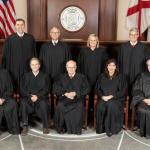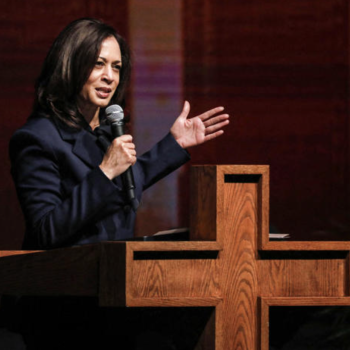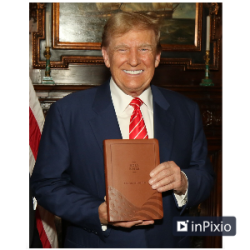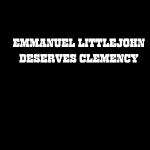Unique Power of Religion
Human history proves religion can be one of the most potent forces for good—or evil. Because it engages with the transcendent, religion looms large over us, dwarfing much of what is earthly, temporal, and material. In my estimation, this makes religious voices unique, commanding, and timeless. Regarding human relations, religion can be an unparalleled uniter or divider. I saw it acting in both modes this week while attending the International Religious Freedom (IRF) Summit in Washington, DC.
The IRF Summit is an annual convening of private individuals, governmental groups, and institutions dedicated to the proposition that the right of freedom of religion and conscience belongs to everyone. The Summit’s charter charges that “all people of goodwill, including leaders of international organizations, nations, religions, civil society institutions, media organizations, policy, and political entities, should begin now to adopt practical steps toward achieving religious freedom for everyone, everywhere.”
Former Religious Freedom Ambassador’s Noble Gig
Since he left government service as President Donald Trump’s U.S. Ambassador-at-Large for International Religious Freedom, the Summit has been the project of former U.S. Senator and Kansas
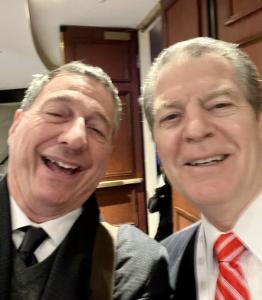
Governor Sam Brownback, whom I’ve known since he first arrived in Washington as a newly-elected congressman in 1994. I’ve always defaulted to addressing elected and appointed officials by their highest title earned, but because of his modesty, I’ve always known the Governor/Senator simply as “Sam.” He stands out to me as one of the most profoundly spiritual people I’ve encountered in official Washington–and one of the few to routinely kneel and pray during a regular workday.
Notwithstanding my admiration for a man I consider my “brother in Christ,” I have significant differences with Sam on social, political, and, yes, even religious matters. That discussion awaits another day–for now, I want to commend Sam and his co-chair for the event, Dr. Katrina Lantos Swett, president of the Lantos Foundation for Human Rights and Justice, for bringing together an impressive array of religious communities, leaders, and advocates of every kind and focus them on something that unites them so effectively. Just that alone is a rare accomplishment, but to further facilitate their collaboration toward a common cause is even more significant.
When the Summit Reached Its Peak
What I found particularly moving about the Summit was how often participants from different faiths reached out to one another publicly, from the main stage, to express their solidarity, concern, and even empathy for and with one another’s struggles and suffering. I observed even more of it on a more personal level around the meal tables, in impromptu exchanges in the hallways, and the cleverly labeled and aesthetically pleasing “Network Lounges” scattered around the facility.
Another element that makes the IRF Summit a rare gathering is the presence of atypical groups such as Evangelicals, the Unification Church, and Mormons, AKA “The Church of Jesus Christ of Latter Day Saints.” Catholics, Protestants, Jews, and even Muslims have engaged in searches for common ground for some time. Still, smaller, more insular, and too often marginalized groups have either been excluded or have declined invitations to join such interreligious exercises. Sam and his team have overcome these barriers and expanded the boundaries of interfaith conversation.
When the Summit Went Downhill
Nonetheless, I saw a pronounced downside at this otherwise exhilarating event. It came on the last day when I attended a “Title Partner Luncheon” with the ostensible theme of “Helping Japan Overcome its Religious Freedom Crisis.” The program began with what are sometimes acerbically called “hostage videos” of talking heads reading dryly from scripts, leaving the speakers to appear under duress. One talking head was a well-known former U.S. Speaker of the House, Newt Gingrich, and the other was former President Donald Trump’s Secretary of State Mike Pompeo. As the two revealed the ulterior motive for the affair, they also set the stage for a distinct rightward turn in the heretofore ideologically balanced atmosphere. This occasion wasn’t as much about Japan as it was about the right-wing Family Federation for World Peace and Unification (FFWPU).
The FFWPU is a global religious movement, often organized as a church body, founded by the late Korean religiopolitical figure Sun Myung Moon, who, in the 1980s, was convicted of felony tax evasion in the United States and imprisoned for 18 months. He founded The Washington Times newspaper, the conservative journal of record in the nation’s capital, and relentlessly crusaded against communism. The nexus with Japan is over reports that Prime Minister Fumio Kishida said during a legislative committee session that courts could dissolve the FFWPU for civil violations of law and regulation. Groups opposed to the FFWPU seek to use lawsuits filed by former members of the Unification Church to justify such a court-ordered dissolution.
Disagreeing Amidst an Agreeable Atmosphere
While she was President Obama’s U.S. Ambassador-at-Large for International Religious Freedom, my long-time colleague and dear friend, the Reverend Dr. Suzan Johnson-Cook, defended the FFWPU against interference by governmental and non-governmental entities. IRF Summit co-chair Dr. Katrina Swett joined Ambassador Johnson-Cook in a recent statement saying, in part, “Dissolving a religious corporation that has not been found guilty of any crime would taint the image of Japan as a country committed to democratic principles.”
I agree with the IRF Summit’s vigorous defense of the FFPWU, which has implications beyond the Unification Church. What I found disturbing, though, were the Gingrich and Pompeo videos, along with a third and protracted one featuring a Japanese lawyer accusing Japanese legislators of caving into “the left,” “leftists,” and “communists.” The technique smacked of American McCarthyism in the 1950s. Challenging the legitimacy of a religious organization does not necessarily mean the challenger is an ideological atheist, much less a Marxist. A country that seeks to keep accountable organizations claiming religious identity does not mean ipso facto that they are “communist.”
The Aggrieved Aren’t off the Hook
The Unification Church, with its substantial business holdings, overt political agenda, and broad reputation for the oppressive control of its adherents, presents questions that most religious entities do not. As important as the rights of religious communities and individuals are, so are the rights of the wider community, organized as a democratic and representative government. The rights of the whole include protecting itself and individuals within it from exploitation and other harms. The responsibilities of duly elected and appointed government officials involve doing just that.
After my 40-plus years defending religious freedom in the United States and abroad, I’ve concluded that religious identity, belief, and practice are at the core of what it means to be human. Religion has also formed the foundation of most human cultures and civilizations. Likewise, religion is often essential to a person or community’s identity. For all these reasons and more, governments must make the preservation, protection, and promotion of religious liberty the utmost priority. Government actors must also pay unusual deference to religious claims.
At the same time, because religion enjoys such a unique status, religious actors must hold themselves and the bodies they represent supremely accountable and willingly submit to extraordinary public scrutiny. Sun Myung Moon and his church have often cast the encounter between government and religion as only an antagonistic one. I would argue it doesn’t need to be that way. Since the inception of the human species, we have organized ourselves in various ways, sometimes religiously, sometimes secularly, but mainly by a combination of both. The encounter between religion and government should be irenic and mutually beneficial. Fostering such congeniality requires a certain degree of humility on each part.
Religion Might Be Tax-Exempt but Isn’t Ethics-Exempt
As recent revelations in the United States have proven, religious entities can perpetrate, or at least facilitate, some of the worst crimes imaginable–even against children. At the same time, research demonstrates religious people are far more generous to charity than their secular counterparts. Ideally, religion should benefit believers and non-believers, and governments should benefit religion to maintain a beneficial loop. However, when it comes to human enterprise, nothing is that simple. The complexity of secular society vis-a-vis religion will always be fraught with major and minor problems–it’s up to both sides to resolve them as amicably as possible.
Hyperbolic accusations, such as those made by the Unification Church and its allies against the Japanese legislature, do not help to foster a positive and reciprocal relationship between church and state. Of course, the hostile pursuit of religious entities and figures for political purposes is counterproductive to positive relationships–to say the least. Government powers must do better in learning about religious people and groups, engaging with them, and deferring to them, while religious groups must do the same with governments. The interaction between the two is a dance–like the tango–in which the partners embrace their roles either as leader or follower, anticipating each other’s moves and artistically working together to enjoy the pleasure of the experience and its outcome.
Unlikely Bedfellows Can Help All Sleep Easier
Religious and secular entities are partners in bringing about social, political, and legal forms that protect, benefit, and contribute to human flourishing. Though they are very different creatures, with often very different objectives and methods for achieving them, spiritual communities and political structures need one another. Villifying each other helps no one and generally damages both. Sam Brownback, Katrina Swett, and all those working with them in the International Freedom movement generally do an excellent job choreographing the complicated dance between church and state, but last Wednesday was a flop. The good thing is there is always time to get back to the dance floor. Once there, as they learn the tango, religionists, and secularists must do less kicking of each other and get kicking together toward making this world a little better for all. I’ll be watching for such a correction next year.




